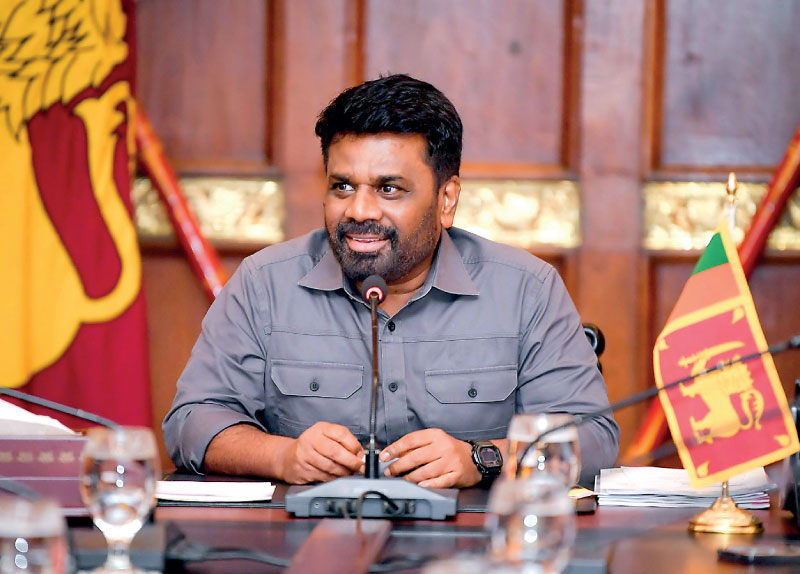Friday Feb 20, 2026
Friday Feb 20, 2026
Thursday, 1 May 2025 00:00 - - {{hitsCtrl.values.hits}}

The JVP/NPP’s transformation is no longer evolutionary; it is a categorical mutation
|
 4. Why metaphors matter
4. Why metaphors matter
Fully aware that Sri Lanka’s political landscape is often clouded by rhetoric and reduced to party lines, perhaps it is time we look elsewhere for insight: toward a language not rooted in ideology, but in nature and science. In times when traditional political analysis no longer suffices, metaphors drawn from Newtonian physics and classical biology may offer a more evocative lens through which to interpret the conduct of Anura Kumara Disanayake (AKD) and the broader evolution of Sri Lanka’s democratic experiment.
This is not a scientific exercise, but a metaphorical exploration. In fact, this is an attempt to read political behaviour through the same patterns that govern motion and survival. Just as physical objects follow laws of force and inertia, and biological organisms mutate to endure, so too do political actors move, adapt, and transform. When hopes rise and disillusionment inevitably follows, as they often do in Sri Lanka, it becomes vital to ask: what deeper forces are at play?
These metaphors will not be treated as academic curiosities but as powerful analytical tools. They help us ask hard questions: Has AKD already begun to mutate under the gravitational pull of political power? Can a movement born in resistance remain ideologically pure when courting statecraft? Are we witnessing evolution or erosion?
In this spirit, we turn to the foundational principles of Newtonian physics and classical biology to decode AKD’s trajectory, and with it, to glimpse the possible shape of progressive politics to come.
5. Newton’s First Law and the inertia of power
Newton’s First Law tells us that an object in motion stays in motion unless acted upon by an external force. AKD’s political journey, especially his emergence as a national figure during the Aragalaya period, embodied a certain momentum: street level credibility, inflated moral clarity, and distance from the corrupt mainstream.
This momentum, once set in motion, attracted vast public energy. The NPP (National People’s Power), under his leadership, became the symbolic vehicle of the people’s frustration and longing for something radically different. But as Newton reminds us, without the right force or with the wrong one, momentum can stall or divert.
That force, in this case, is State power. The system AKD now seeks to engage with is designed to absorb, neutralise, or transform opposition forces. His challenge is not just to maintain momentum, but to resist being absorbed by the very establishment his rhetoric has long condemned.
5.1 Forces of resistance
In AKD’s case, three distinct forms of resistance have begun to slow or reshape his trajectory:
(a)Popular dissent:
Disillusionment has crept in as campaign promises appear increasingly unrealistic or opportunistic. The idealistic energy that once propelled the NPP is now tempered by public scepticism.
(b)External pressures:
Global economic dynamics and geopolitical constraints (IMF policies, Trump era tariff wars, recent Al Jazeera exposés, and secret MoUs with India) have narrowed AKD’s policy bandwidth, forcing uncomfortable compromises. In particular, when the United States struck with a 44% tariff, and a narrow grace of 90 days was offered, his feet began to tremble. In that moment of reckoning, he opened his doors not to the quiet custodians of hope, but to ghouls who had been cornered. Those once cast out for wrecking the nation crept back from their cleft rocks, eager to guide him.
(C)Institutional gravity:
The Sri Lankan state apparatus itself is designed to coopt and neutralise. AKD’s conduct, marked by questionable appointments and missed reform opportunities, suggests he is already feeling its gravitational pull.
5.2 Newton’s Second Law: Force, mass, and political acceleration
Newton’s Second Law (F = ma) suggests that greater public force and weaker institutional mass lead to faster political acceleration. When Sri Lanka’s Attorney General abruptly discontinued the case related to the 2009 assassination of journalist Lasantha Wickrematunge, the backlash was swift. Civil society, led by Ahimsa Wickrematunge, generated enough political and moral mass to force a reversal. It was a rare but powerful example of collective action overpowering institutional inertia.
5.3 Newton’s Third Law: Political action and reaction
Newton’s Third Law states that every action has an equal and opposite reaction. In politics, no policy or promise exists in a vacuum. AKD’s rise has provoked resistance not only from entrenched elites and media channels, but also from his own base. Young voters and working-class citizens are increasingly asking:
Where are the clear economic plans?
Why the silence on judicial reform?
Why uphold a National List system that contradicts constitutional ideals?
Why reappoint corrupt figures and avoid transparency?
These are not attacks from enemies, but reactions from disappointed allies. Newton’s law reminds us: neglect or betrayal creates an equal counterforce. Disillusionment is now massing on the same ground where hope once stood.
6. Biological adaptation
Is that mutation or metamorphosis? Biology teaches us that survival favours adaptability, not strength. Political movements, like organisms, must evolve to endure. But in doing so, they risk mutation.
AKD now speaks in polished tones, reassures business elites, and skirts around former radicalisms. Is this strategic adaptation or ideological drift? Just as species can adapt so thoroughly that they lose their defining traits, a political movement can assimilate so deeply into the mainstream that it becomes indistinguishable from the forces it once opposed.
7. Metaphor in motion: Politics as physics and biology
Professor Eliot Cohen once remarked that modern politics resembles a fantastical branch of biology or physics, where time reverses itself, the seemingly solid proves hollow, and light disappears into political black holes. The past refuses to stay buried; spectres rise from the grave, monsters emerge from cracks in the earth, and prehistoric predators not only return but develop language—and worse, the ability to unlock doors.
In Sri Lanka, AKD’s administration embodies this strange physics: past corruptions reanimated, long forgotten alliances revived, and the promises of yesterday conveniently forgotten. Consider this: during his campaign, AKD vowed to confiscate luxury assets from former presidents and slash their extravagant security details. Six months into power, those promises remain unfulfilled. This reveals not merely a failure of policy, but a deeper phenomenon—mutation.
8. From promise to performance: The problem of political species
The JVP/NPP’s transformation is no longer evolutionary; it is a categorical mutation. The current iteration aligns with capitalist and IMF friendly policies, diverging sharply from its revolutionary past. This is no longer the JVP of 1971 or 1989; it is a new species, dressed in old language.
Political gravity is pulling hard. Momentum is slowing. What once seemed like a butterfly emerging from a cocoon now appears more like a chimera: part promise, part performance, part parody.
One must consider the upcoming local government elections and the NPP/AKD’s expectations of a nationwide victory amid growing voter disillusionment.
Local government elections are slated for 6 May. The administration anticipates victory, interpreting it as a public endorsement. But Newtonian laws offer a sobering reminder: the buildup of force — disappointment, economic pain, unkept promises — can generate reactions with unpredictable consequences.
The gravitational pull of disenfranchised workers and rural populations may be strong enough to slow, or even reverse, the current trajectory. We may witness not a soaring triumph, but a flattening curve — a return to political ground level.
Before turning to the details of the Batalanda and Matale massacres, it is worth offering a lens — whether through Newtonian physics or traditional biology — to consider what may yet unfold. If justice is a force, will it finally overcome inertia? If the state is a body, can it still resist the infection of impunity, or has it grown too accustomed to it?
What follows is not merely a record of atrocity, but a question of probability: should a true inquiry emerge, it will not occur by accident. Let the reader decide, through these metaphors, whether such an outcome still lives within the realm of the possible.
The Shylocks of Batalanda and Matale
In the shadowed corners of Sri Lanka’s not so distant past lie the blood-soaked memories of Batalanda and Matale — torture camps where thousands of young lives were extinguished under the guise of national security. Today, the few who survived these massacres — living witnesses to unspeakable cruelty — rise again, not in violence, but in righteous demand. They ask not merely for justice, but for accountability: a pound of flesh from those who orchestrated and sanctioned these crimes against their own people.
Among those long implicated is none other than RW — a man whose name echoes across the years not as a phantom of guilt, but as a silent steward of impunity. As Minister of Industries during the late 1980s under the regimes of President J.R. Jayewardene and R. Premadasa, his proximity to the machinery of repression cannot be ignored. His recent interview with Al Jazeera — cool, detached — reveals not repentance, but indolence: a shrug in the face of historical horror.
Yet irony twists deeper. RW, no longer a true political adversary, now finds himself propping up the very economic scaffolding upon which the National People’s Power (NPP) and its leader, AKD, hang their hopes. The IMF austerity package — his legacy — has become the reluctant lifeline of a nation drowning in debt and despair. And so, the unthinkable happens: the victims’ cries are drowned out by economic pragmatism, and the past is buried beneath the promises of tomorrow.
But history, like Shakespeare’s Shylock, does not forget: “The villainy you teach me, I will execute, and it shall go hard but I will better the instruction.” The survivors may become the Shylocks of our time — relentless in their demand, unmoved by pleas for mercy. Not out of vengeance alone, but because justice denied becomes justice perverted.
9. Conclusion
The laws still apply
In the end, Newtonian physics and traditional biology do not offer political solutions. But they do offer clarity. They teach us that actions provoke reactions. That inertia must be overcome with real force. That adaptation comes with consequences. And that organisms — or movements — can change so drastically they are no longer recognisable.
AKD remains a central political force. But whether he becomes a transformative leader or simply another casualty of political decay depends not on slogans, but on his ability to resist the pull of compromise. It depends on whether he can uphold the ideals he once stood for.
The real question, then, is not whether AKD will change. It is what kind of change the people will demand, what they will accept, and what they will resist.
(The writer, a former academic at the University of Peradeniya, is a noted expert on Sri Lanka’s political economy. His doctoral research examined the country’s complex ties with the IMF and World Bank from 1960 to 1985, highlighting key economic and ideological shifts. He is currently analysing the political and legal dimensions of Sri Lanka’s decline in upholding the rule of law and judicial independence, framing it within a broader pattern of institutional erosion and executive dominance. He can be reached at [email protected].)

Part 1 of this article can be seen at https://www.ft.lk/columns/Political-alchemy-from-messiah-to-machinery-Rise-and-mutation-of-AKD-Part-1/4-775994